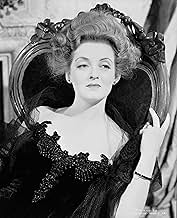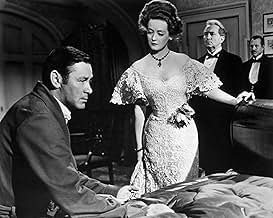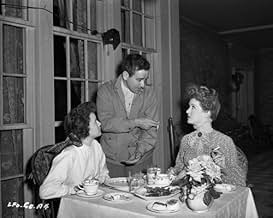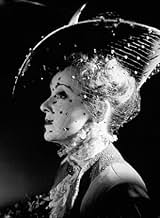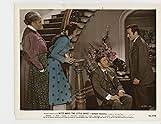El clan Hubbard, rico y sin escrúpulos, vive y envenena el sur profundo a principios del siglo XX.El clan Hubbard, rico y sin escrúpulos, vive y envenena el sur profundo a principios del siglo XX.El clan Hubbard, rico y sin escrúpulos, vive y envenena el sur profundo a principios del siglo XX.
- Dirección
- Guionistas
- Elenco
- Nominado a 9 premios Óscar
- 8 premios ganados y 10 nominaciones en total
- Party Guest
- (sin créditos)
- Bit Part
- (sin créditos)
Opiniones destacadas
Davis is the sister of Ben and Oscar Hubbard, Charles Dingle and Carl Benton Reid. They are a family of trades people, poor white trash in those halcyon years in the South before the Civil War. When the war laid the genteel planter class low, these are the people who prospered and became what was euphemistically entitled 'the new South.'
They're a tough and ruthless family, but they are survivors though the next generation shows little promise because Dan Duryea who is the son of Reid and Patricia Collinge is an idiot and Teresa Wright, the daughter of Davis and Herbert Marshall will be rejecting the values of the previous Hubbard generation.
I don't think Lillian Hellman's Marxist leanings were ever more prominently on display in her writing as in The Little Foxes. Though the characters she creates are brilliant, the elder Hubbards are a rather heavy handed symbols for greedy capitalism. It's not quite clear where Teresa Wright and her suitor Richard Carlson will be on the political spectrum having rejected Hubbard family values.
The plot of the play itself is that Dingle and Reid are ready to invest in a cotton mill with northern businessman Russell Hicks. But they need more money which they're hoping Marshall and Davis will provide. That leads to all kinds of complications, legal and moral for the family.
Hellman left it open as to what will happen. My guess is that she honestly didn't know. Like most Marxists of the day, especially American Marxists, they sat and waited for the great come and get it revolution like fervent Pentacostals waiting for the Judgement Day. Wright in fact wishes for a society where people like her mother and uncles don't run things.
Sadly and this is the weakness of The Little Foxes is that Hellman drew her characters too well. I'd be willing to bet that Ben and Oscar would find a way to wind up Commisars if they had been transplanted into Russia during the revolution. Idealists had a short life span in the early days of the Soviet Union, never more so than after Joseph Stalin took over. Whatever else they are, the Hubbards ain't idealists.
Still The Little Foxes is a riveting drama that will keep your interest through the whole film even if you don't buy the message totally.
Several things work together to make "The Little Foxes" a worthwhile classic. The cast could hardly be improved upon, with the great Bette Davis taking center stage with a role that has her in her element, Herbert Marshall in a role ideal for him, and the supporting roles filled by talented performers who are themselves, in most cases, very well-cast.
The script, likewise, is a well-conceived and well-paced adaptation of the Lillian Hellman play. Finally, William Wyler and his crew piece everything together effectively. Wyler might not be the kind of director who draws a lot of raves for innovation or experimentation, but when he has a good cast and good material, he knows how to make it work.
One of the movie's several noteworthy features is the pace. Much of the first half seems to move quite slowly, and much later the pace of events begins to build steadily. The first part contains many less obvious touches that fit together well, so it is worth watching carefully, even if parts of it seem slow. In the second part, the characters' cat-and-mouse games and attempts to outwit each other come to a head, resulting in some compelling moments.
It might be even more satisfying to watch after you have already seen the movie once, because the numerous subtle points that help to establish the characters then come out more clearly, and the way that things fit together is also easier to see. In any case, it is a classic that has held up well.
It's a story about money and how to use it or how to acquire more of it through deceit and greed. Davis, as "Regina Gidden," is the most greedy of the Gidden clan, vying for more money with her brothers who aren't exactly trustworthy people themselves. Among the three, there wasn't anyone to root for since the family shared in their lust for money. Davis does her normal excellent acting job but I enjoyed Charles Dingle as "(Uncle) Ben Hubbard" best. I liked his lines more than anyone's and the way he delivered them. Carl Benton Reid played the other greedy Hubbard brother, "Oscar" and Dan Duryea was interesting as Oscar's dumb son, 'Leo."
Herbert Marshall was good, too, as Regina's husband "Horace." He was an honest, principled man and thus, the black sheep in that household. Unfortunately, he was dying and his death played a big part in this story.
The sub-plot in this tale is the coming-of-age of Hubbard daughter "Alexandra" played by Teresa Wright. Her "coming of age" translates to finally standing up to her domineering mother. Richard Carlson plays her reluctant boyfriend "David Hewitt" who, in the end, is won over when "Alexandra" grows up.
So, this excellent cast, complemented by an outstanding director in William Wyler and world-class cinematographer Gregg Toland all adds up to a solid, memorable film.
¿Sabías que…?
- TriviaBette Davis had legendary makeup artist Perc Westmore devise a white mask-like effect for her face to emphasize Regina's coldness. William Wyler hated it, likening it to a Kabuki mask.
- ErroresAt the end, just before Alexandra leaves Regina, when Regina climbs the stairs and asks Zan if she would "like to sleep in her room tonight", there is a chair in the background (which earlier Regina had been sitting in). There is nothing on the chair. Two shots later, when Alexandra goes to collect her hat and coat to leave, they are on the chair.
- Citas
Horace Giddens: Maybe it's easy for the dying to be honest. I'm sick of you, sick of this house, sick of my unhappy life with you. I'm sick of your brothers and their dirty tricks to make a dime. There must be better ways of getting rich than building sweatshops and pounding the bones of the town to make dividends for you to spend. You'll wreck the town, you and your brothers. You'll wreck the country, you and your kind, if they let you. But not me, I'll die my own way, and I'll do it without making the world worse. I leave that to you.
- Créditos curiososOpening credits prologue:
"Take us the foxes, The little foxes, that spoil the vines:
For our vines have tender grapes." The Song of Solomon 2:15
Little foxes have lived in all times, in all places. This family happened to live in the deep South in the year 1900.
- ConexionesEdited into Myra Breckinridge (1970)
- Bandas sonorasNever Too Weary to Pray
(1941) (uncredited)
Music and Lyrics by Meredith Willson
Sung off-screen by an unidentified group during the opening and closing credits
Selecciones populares
- How long is The Little Foxes?Con tecnología de Alexa
Detalles
- Tiempo de ejecución1 hora 56 minutos
- Color
- Relación de aspecto
- 1.37 : 1
Contribuir a esta página




